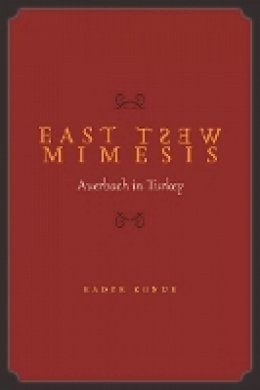Kader Konuk is Associate Professor of German Studies and Comparative Literature at the University of Michigan.
"Konuk's groundbreaking study significantly enhances our understanding of the shared intellectual, literary, and political history that links twentieth-century Turkey to major developments in Europe. Her work poses a significant challenge to persistent beliefs about the 'backwardness' and 'Orientalness' of modern Turkey, revealing that Turkey has never been properly understood in the context of the Orientalism debate."—Nina Berman, Ohio State University "East West Mimesis offers a revelatory reinterpretation of comparative literature's founding texts, and a first-rate piece of detective work, showing the scholarly world something it would otherwise never know: how much the scale of thinking encouraged by comparative literature is the accidental byproduct of Turkish attempts to grasp the West as a totality."—Katie Trumpener, Yale University "Through an edifying dual perspective on text and location, Kader Konuk's East West Mimesis: Auerbach in Turkey tells a fascinating story about the development of modern Turkey just as much as it does about Auerbach's classic work. Immensely readable and engaging, her book is distinguished by extensive archival research into a pivotal phase of modern Turkish cultural history, yielding rich insights into how this period of transformation impacted Auerbach's groundbreaking work of modern comparatism. East West Mimesis deepens our understanding of how Turkey's project of strengthening its ties with Europe in the 1930s opened Turkish culture to its classical heritage, at the same time that its reclaiming of Western secular humanism as a shared legacy served to obscure the problematic histories of racial minorities in Turkish society. Simultaneously, Konuk significantly re-positions Auerbach as a critic who, far from absorbing Turkish transformations of secular life into his writing, decontexualized the cultural and religious environment in which he was located. Konuk's illuminating study of Auerbach's ambiguous relation to Turkey makes a valuable intervention in challenging the standard narrative about Auerbach's exile. Konuk offers a model of comparative literary scholarship that attends keenly to the locations in which major critical works are produced, restoring the histories of those places even as they are displaced by concerns that appear to be far removed from the tumultuous changes occurring at the scene of writing."—Wellek Prize Committee

